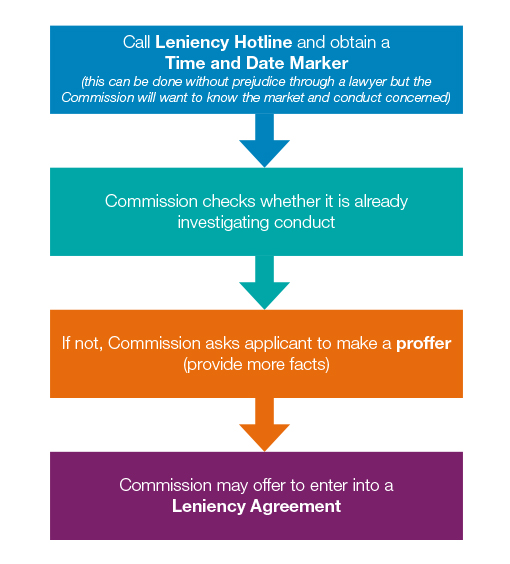Competition law update: Draft Leniency Policy, October 2015
The Hong Kong Competition Ordinance (Ordinance) was enacted on 14 June 2012 and its operative provisions finally come into full force on 14 December 2015. The Ordinance will apply to all sectors of Hong Kong’s economy including the aviation, construction, insurance and shipping sectors (to name a few).
The Ordinance prohibits three types of anti-competitive conduct:
- Anti-competitive agreements between undertakings (First Conduct Rule).
- Abuse of substantial market power (Second Conduct Rule).
- Anti-competitive mergers involving telecommunications carrier licensees (Merger Rule).
These rules will be enforced by the Competition Commission (Commission) and the Competition Tribunal (Tribunal) – with investigation and enforcement (functions of the Commission) having been deliberately separated from sanctioning, hearing appeals and hearing of follow-on actions described below (functions of the Tribunal).
Leniency
Section 80 of the Ordinance reads:
(1) The Commission may, in exchange for a person’s co-operation in an investigation or in proceedings under this Ordinance, make an agreement (a “leniency agreement”) with the person, on any terms it considers appropriate, that it will not bring or continue proceedings under Part 6 for a pecuniary penalty in respect of an alleged contravention of a conduct rule against…
(2) The Commission must not, while a leniency agreement is in force, bring or continue proceedings under Part 6 for a pecuniary penalty in breach of that leniency agreement.
Section 80 of the Ordinance, which applies to all three conduct rules (set out above), thus gives the Commission discretion to enter into leniency agreements as inducements to offenders to co-operate.
Draft Leniency Policy
On 23 September 2015, the Commission issued its “Draft Leniency Policy for Undertakings Engaged in Cartel Conduct”, which attaches a template leniency agreement (Draft Policy), and invited interested persons to submit written comments by 18:00 on 23 October 2015. The Draft Policy1 is intended as an investigative tool to combat contraventions of the First Conduct Rule (i.e. price fixing, bid rigging, market sharing and output restrictions) which tends to be difficult to detect. It does not relate to the other two conduct rules.
The Commission proposes to offer leniency treatment to the first undertaking (which basically means company) which blows the whistle on a contravention in circumstances where the Commission has not already commenced proceedings. In exchange, the Commission undertakes not to bring proceedings against the whistleblower, provided that the undertaking meets all the requirements prescribed by the Draft Policy – including full cooperation with the Commission, signing a leniency agreement and being prepared to sign a statement of agreed facts admitting to its participation in the contravention by reference to which the Tribunal may make an order declaring that the undertaking has contravened the First Conduct Rule (Statement of Facts). The application process for applying leniency is outlined below:

We highlight below some features of the Draft Policy which may merit the making of consultation responses.
- The Draft Policy is “winner takes it all” with only the first whistleblower able to benefit (hence the marker system). The reason for this is that the Tribunal (not the Commission) fixes penalties and thus the Commission can only bind itself not to prosecute – it cannot bind the tribunal to sanction subsequent whistleblowers less. While the Draft Policy (section 4 on undertakings which do not qualify for leniency) refers to the Commission’s “favourable treatment” of subsequent whistleblowers, it does not spell out what this means. It is likely that the Commission would make submissions to the Tribunal to reduce penalties but the Tribunal is not bound to follow such submissions. It would provide more certainty if the Tribunal produced a fining guideline setting out what reductions are available to subsequent whistleblowers.
- The Draft Policy does not preclude the Commission from entering into leniency agreements in respect of an alleged contravention of a conduct rule which is not covered by the Draft Policy (e.g. where the Commission has already decided to issue an infringement notice or commence proceedings in respect of a contravention of the First Conduct Rule). As mentioned above, the Draft Policy does not cover contraventions of the other two conduct rules. The terms and conditions of such leniency agreements would have to be negotiated on a case by case basis. At present the Commission does not appear to wish to bind itself by issuing further policies (although it could).
- The Draft Policy clearly states that it does “not preclude the possibility of a follow-on action under section 110 of the Ordinance against cartel members, including a party to the leniency agreement, by persons who can prove that they have suffered loss or damage as a result of the cartel”. Follow-on actions have the potential to lead to substantial awards. However, applicants for leniency must be prepared to sign a Statement of Facts. The Draft Policy does not spell out the scope of the Statement of Facts or what form is it to take – e.g. will it be attached to the leniency agreement? This requires clarification as this uncertainty could be a major disincentive to whistleblowers.
For more information, please contact Vincent Liu, Partner, on +852 3983 7682, or vincent.liu@hfw.com, or Caroline Thomas, Senior Associate, on +852 3983 7664, or caroline.thomas@hfw.com, or your usual contact at HFW. Research conducted by Tony Wong, Trainee Solicitor.
Footnote










